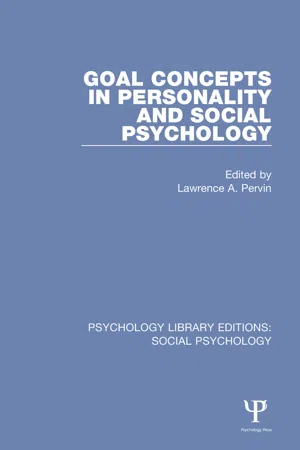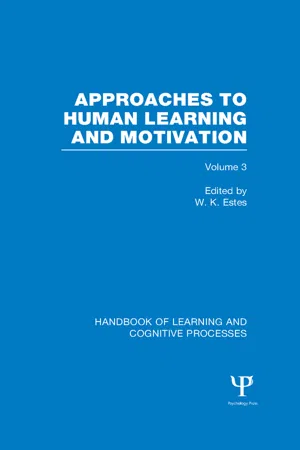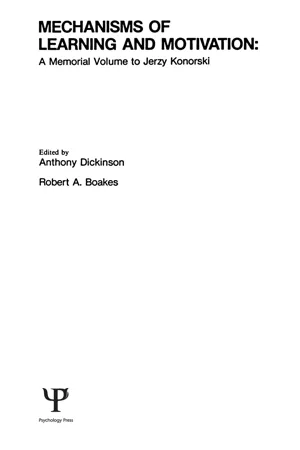Concept of Motivation
Motivation refers to the driving force behind an individual's actions, desires, and needs. It involves the internal and external factors that stimulate the initiation, direction, intensity, and persistence of behavior. Motivation can be influenced by biological, psychological, and social factors, and plays a crucial role in shaping human behavior and achievement.
6 Key excerpts on "Concept of Motivation"
- eBook - ePub
- Phil Evans(Author)
- 2015(Publication Date)
- Psychology Press(Publisher)
...1 A background to the study of motivation It is not too difficult to see why motivation has become one of the central areas of investigation for psychologists. The science of psychology is more often than not defined as the study of behaviour and experience. When we witness an instance of behaviour, we want to ask the question: why? Why is that man, who is standing on the street corner, looking up at that tall building, and why now have half a dozen passers-by joined him in his gazing activity? Or in the laboratory, why is that white rat turning a wheel, now jumping over a barrier, and now running through the white door rather than the black one? The essence of the enquiring mind is not simply to observe behaviour but to find reasons for it and explain it. But reasons can be given at many different levels, depending on who is in search of the explanation, and when he is going to be satisfied. To illustrate this never-ending regress of explanation, we have only to look at the verbal behaviour of a typical five-year-old, who responds to every suggested explanation with a further 'why' question until we are in realms of explanation which present difficulties even for the omniscient parent. Obviously there must be an end called somewhere, and this is achieved by the simple expedient of drawing rough boundaries for an area of enquiry. This is clearly seen in the field of motivation: psychologists may use purely psychological words such as 'motive' and 'purpose' in their explanatory schema; they might also find it useful to go to the limits of their discipline which border physiology and look at the physiological bases of motivation (see A2 of Essential Psychology); in other cases they may be interested in the border with sociology and look at the influence of society on the behaviour of the individual (see B1)...
- eBook - ePub
- Bere Mahoney(Author)
- 2011(Publication Date)
- Learning Matters(Publisher)
...Therefore, it is important that you have some prior knowledge and understanding of these issues. Furthermore, by this point you should have developed critical thinking skills that should help you understand a topic that is challenging and that is fundamentally a synthesis of many parts of individual differences and psychology in general. Importantly, at this point you should have awareness that individual differences psychology is concerned with how we regulate ourselves, and self-regulation is at the heart of contemporary conceptualisations of motivation. In the next section we will consider how approaches to conceptualising human motivation have changed historically by focusing on some of the key questions asked in the research on motivation in the field, and by considering in more detail what is meant by top-down and bottom-up approaches to human motivation. History of motivation research Key questions Certain key questions have dominated the history of motivation research, and these questions still shape contemporary research. What is motivation? What motivates humans, and can these be regarded as universal or relative? Why do individuals vary in their motivation (intra-individual variation and inter-individual differences)? What is the relationship between motivation, dispositions and contexts? Interest in why we behave as we do is a central feature in the writings of ancient philosophers such as Aristotle (Reiss, 2004), and in the work of classic researchers in the discipline of psychology such as Freud (Caprara and Cervone, 2000) and William James (1890). The concept of instinct was important in this early work. For example, Allport (1937) in his classic paper ‘The functional autonomy of motives’, argued that psychology as a discipline and in particular personality psychology is essentially about motivation: Any type of psychology that treats motives, thereby endeavouring to answer the question as to why men behave as they do, is called a dynamic psychology...
- eBook - ePub
Motivating Humans
Goals, Emotions, and Personal Agency Beliefs
- Martin Eugene Ford(Author)
- 1992(Publication Date)
- SAGE Publications, Inc(Publisher)
...Consequently, it is often used in ambiguous or imprecise ways (deCharms, 1987; D. Ford, 1987). Nevertheless, if it is carefully defined and delimited, the Concept of Motivation provides a uniquely valuable way of describing the integrated patterning of a set of intimately related processes. Thus, based on the foregoing analysis, the Concept of Motivation is defined in Motivational Systems Theory as the organized patterning of an individual’s personal goals, emotions, and personal agency beliefs. Symbolically this can be represented as a formula of three interacting components: Motivation = Goals × Emotions × Personal Agency Beliefs Thus motivation is an integrative construct representing the direction a person is going, the emotional energy and affective experience supporting or inhibiting movement in that direction, and the expectancies a person has about whether they can ultimately reach their destination...
- Lawrence A. Pervin, Lawrence A. Pervin(Authors)
- 2015(Publication Date)
- Psychology Press(Publisher)
...1 Goal Concepts in Personality and Social Psychology: A Historical Introduction LAWRENCE A. PERVIN Rutgers University Is behavior motivated? And, if so, can it be motivated by the anticipation of future events? What role does cognition play in such motivational processes? And, further, what role does motivation play in ongoing cognitive activity? Questions such as these provide the foundation for this book. More specifically, the chapters in this book address the question of the utility of goals concepts in studying motivation and social cognition. These questions may seem obvious. Yet, the history of the field suggests otherwise and careful consideration leads one into issues that have preoccupied philosophers for centuries. Only a decade ago a review of 24 years of the distinguished Nebraska Symposium on Motivation suggested that the Concept of Motivation had ceased to be of major concern to the field and was of questionable utility as a scientific construct (Benjamin & Jones, 1978). As noted by Cofer (1981), the demise of drive theory toward the end of the 1960s was associated more generally with a decline in motivation theory. Though a chapter on cognition did not appear in the Annual Review of Psychology until 1966 (Van de Geer & Jaspars, 1966), cognition and information processing rapidly displaced motivation as a dominant issue of concern to psychologists. That is, not only did cognition rise as an area of interest, but it supplanted other areas of interest, such as motivation (Pervin, 1980). Thus, Cofer (1981) noted that most cognitive theorists did not consider issues traditionally addressed by motivation theorists and asked: "Where, in cognitive theory, are the strong urges and the 'hot' emotions or passions that have been central to our thinking in respect to motivation and emotion for so long?" (p. 51). Yet, to juxtapose cognition and motivation in relation to one another may unduly simplify the matter...
- eBook - ePub
Handbook of Learning and Cognitive Processes (Volume 3)
Approaches to Human Learning and Motivation
- William Estes(Author)
- 2014(Publication Date)
- Psychology Press(Publisher)
...Until recently, behavioral scientists were very reluctant to consider any parameters other than physical (that is, temporal and spatial) in learning (see Section VA.2). It is not clear now what will ultimately prove to be the best way for them to deal with the more complex relations characteristic of the behavioral and cognitive realm. On the basis of results obtained up to now, it should not be assumed that subjective differences in terms of context, meaning, and cognitive processing have no impact (see, among others, Bandura’s recent presidential address, 1974; cf. also Jenkins, 1974). At this stage, however, there may be some advantages in presenting subjects with instructions and tasks that do not allow for an uncontrolled variety of information-processing and response strategies as situations and variables based in, or suggested by, the nature of the task itself are preferable to conditions artificially, or at least superficially, induced by complex instructions. II. BASIC CONCEPTS Let us state what is meant by the terms motivation and reward in learning, when discussing their role in the context of this chapter. A. Motivation as a Cognitive–Dynamic Structure In many learning experiments, motivation has been manipulated in such terms as deprivation time with regard to physiological needs, amount of reward, less or more severe electric shocks, and so on. With human subjects, threat of failure and other situations inducing stress and anxiety have been studied as motivational factors in learning. I refer to a rather different Concept of Motivation in the title of this chapter. It is assumed that in human beings motivational and cognitive functions collaborate in building up object-directed means–end structures, such as tasks, projects, plans, intentions, and interests. Cognitive–dynamic structures of this kind seem to have special relevance in human behavior, since most of human activity is made up of super- and coordinated plans or interests...
- eBook - ePub
Mechanisms of Learning and Motivation
A Memorial Volume To Jerzy Konorski
- A. Dickinson, R. A. Boakes(Authors)
- 2014(Publication Date)
- Psychology Press(Publisher)
...The term "motivation" was invented for propaganda purposes by the metaphysician Schopenhauer, 1 and has invaded ordinary speech and psychological textbooks with somewhat different meanings. Most psychologists readily admit that the term is little more than an attractive chapter heading. And yet there is a persistent feeling that the action of a "motivational" variable, such as food deprivation, differs in some fundamental way from the mode of action of associative factors. In Konorski's model of learning, this distinction is to a certain extent maintained, but in addition he described a number of ways in which ostensibly "motivational" variables, such as food deprivation, affect response instigation in much the same way as do external stimuli. The model is a highly eclectic one, in which most of the mechanisms that have been contrasted so energetically by other learning theorists seem to find their place from time to time and to coexist perfectly happily. It is far from Clear which of the several factors affecting response instigation in Konorski's model would be called "motivational" by universal consent, and which would not. The view that is developed in this chapter is that such a question of terminology is of little importance in the long run, and that attention to specifics is more valuable than arguing about whether the effect of a given variable should be considered "motivational" or not. In several places Konorski used the scholastic term "spiritus movens" for the collection of factors involved in the instigation of behavior. For example (1967), "the spiritus movens for instrumental responses is provided by emotive factors or drives which not only enable the formation of particular Type II CR's but are also indispensable for their elicitation (p...





